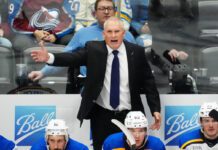On Episode 5 of the MLHS podcast, Ian Tulloch and Anthony Petrielli discussed Zach Hyman’s impressive evolution as a player, his value to the Leafs, and the price tag of his next contract.
Support the MLHS Podcast on Patreon
Early-release full-length video episodes are available to our patrons each week:
Tulloch: Zach Hyman being the offensive driver of his own line — not something I thought I’d say years ago. He always seemed like the complementary player who is going to dive into the corner, win a puck battle, and then the skilled players come in and get it.
Lately, he has been playing on that third line with Mikheyev and Engvall. Previously, it was the same thing with Mikheyev and Kerfoot. They have been doing it a lot on the road this year, with Hyman in the top six at home and on the third line on the road. The idea would be to spread the talent throughout the lineup so that you don’t get caught with your third line without Hyman out against the other team’s top lines. It gives you a few lines that give you a chance against some of the top lines.
Hyman has always been a complementary presence, but now that he is in more of an offensive role, he is a lot better in this regard than I might’ve expected.
Petrielli: I want to take a moment to gush about how good he has become. It is wild. When he first entered the league, one thing I pointed out right away is that he should probably play on his strong side. That is where he is right now, and that is where he has always looked his best — especially making plays off of the rush. There was a point where he was playing with Matthews and Nylander earlier in his career and he couldn’t really handle a pass on the backhand as Matthews and Nylander were zipping it all over the ice.
Tulloch: Andrew Berkshire had a number on him that he finished on 2% of passes into the slot. By the numbers, those are 35-40% chances that should be going in. He just wasn’t scoring.
Petrielli: He knew his job. Give him credit. He forechecked and he went to the net. That was it. Matthews and Nylander kind of ignored him to some degree and played pitch and catch amongst themselves. Whatever happens with Hyman — puck goes in off his shinpad or ankle — happens.
Now we are seeing him make plays.
Tulloch: He is trying to make a play skill-wise, which is something they’ve been working on with him over the past few years. He is going to barrel himself into a corner and win puck battles there, but when you get him in open space, what can he do with the puck?
What I have been really impressed with lately is his stick-handling ability to get himself into better positions. In the last couple of years, I don’t remember myself marveling at his puck skills, but now you are seeing him go to his backhand more often and he is having more success offensively because of his puck-handling ability.
Petrielli: Some of it is a little bit circumstantial in terms of getting more opportunities to do his own thing. Two years ago in the playoffs against Boston, he had a goal where he went down his strong side, drove the net, pulled it backhand, and it was a gorgeous goal.
Everyone was thinking, “Where did that come from?” It’s Zach Hyman on his strong side.
Now he is getting a little bit more opportunity where he can be the primary puck handler. Under no circumstance should Hyman be carrying the mail in terms of possession and making plays with the puck when he is playing with Matthews, Marner, or Nylander on his line. But with Ilya Mikheyev and Pierre Engvall, Hyman can look at those guys and think, “I am going to make plays with the puck. You guys go to the net and make those kinds of plays happen. I can be a little bit more of the guy who is leading the charge in terms of what we are doing offensively.”
Give him credit. If you went into the season and said, “Can you give this guy his own line to carry?”, you would’ve thought he was more of a complementary guy, but he looks right now like a player who can carry a line.
Tulloch: He has 13 points in 21 games. Last year, he was on course over an 82-game season to pass the 30-goal mark. He was riding a high shooting percentage, but he has a couple of 20-goal seasons under his belt and he is going to be an unrestricted free agent after this season.
Is this the player who the fan base and organization falls in love with, they sign him to a big extension because he is a hard-nosed, lunch-pail player, but in a couple of years, you are really regretting that contract similar to Josh Anderson? He is everything you want in a player in a playoff series — the defensive presence, the guy who can win a battle, the guy who seems to make everyone play better because of his raw energy on every shift. Those are attributes you are always looking for. But when he is in his 30s with a couple of injuries, it is all of a sudden a deteriorating asset?
Would you be comfortable with the Josh Anderson contract for Hyman (5.5×7)?
Petrielli: I would have hesitations on it, to be honest. He is turning 29 this year. He played 51 games last season. In his first two full seasons, he played 82 games back-to-back, and then he went down to 71 and then down to 51. I am a little bit worried about how that plays out.
But it sucks we have to talk about contracts all the time. You can never have truly nice things in a cap world. It is always a case of, “Who is coming up next?” It is part of the package of signing all of the star players, which they had to do.
Tulloch: In the first few years of a contract, he is going to be good, and that is the Leafs‘ window. Same with the Muzzin contract and the Brodie contract. You may not love year three or four of it, but it gives them a chance to win right now in the window. Is he the type of player you sign because you are in your window right now, or are you concerned about the long-term ramifications like in the JVR or Bozak situation?
Petrielli: If we go to the Josh Anderson contract, seven years would be problematic. But if we stick to the $5.5 million, he is worth more than that right now. Today, he is worth more than $5.5 million, I would say. He is a high-end penalty killer. He can play up and down the lineup on left wing or right wing. He fits with anybody. He can carry his own line. He can be complementary to your star players. His production is good.
Tulloch: If you look at the Leaf players who are trusted among top competition, he is always among the leaders there.
Petrielli: This sounds weird to say — people may say this makes no sense — but in a wild world where the Leafs win the Cup, I would be more likely to let him walk. The price tag would probably be insane. If they’ve got one, they could see if they can go from there and figure it out with whatever cap space we have but not go absolutely wild.
I do hate this aspect of the league as a whole. We saw Chicago have a dynasty going and they were picked apart like a carcass. We have seen a few of these times squeezed out by the cap. I like having elite, elite teams. It is good for the league.
People always say, “Is it good for the league to have the same teams winning year after year?” Yeah, it is! People hate their guts, and people feeling something for a team — whether it is hate or love — is ultimately good. When it is just bland — this year it is Dallas, last year it is whoever — it is whatever. When it is the same team over and over, and you either hate them or love them, that is what really draws people in and gets them invested.
When it comes to the NBA, I do not want the Brooklyn Nets to win. I want to watch them, but I want them to lose. If they lose, it is going to make me happy.
Tulloch: No push back from me, only Gary Bettman and the small-market teams, and the desire for parity and the loser points.
Petrielli: Parity is trash. It is not good for the product. Get rid of loser points, and make it three-point wins in regulation. It is ridiculous. Teams fool themselves and it also makes trade deadlines crappier. When teams are sitting there out of the playoffs knowing they’re bad and wanting to sell like crazy, it makes for a good trade deadline — not these crappy ones where we are watching fourth-round picks fly around for random depth players.
Tulloch: Back to Zach Hyman, if you had to choose between Rielly and Hyman moving forward, who are you choosing? It might come down to that.
Petrielli: My initial reaction — and my heart says this — is Zach Hyman. The Leafs have a number of good young defensemen that I like. I really like Rasmus Sandin. I think he is a player or is going to be a player. I’ve liked Travis Dermott when he moves into the top four. He has generally held up well. He would be a good player challenged with more responsibility and opportunity.
Tulloch: He and Justin Holl in a second-pairing role.
Petrielli: They would really miss Rielly on the power play. They have a really good power play and that is important to the Leafs‘ success. I don’t want to take it for granted. Rielly plays a ton. He is really productive. He is good on the power play. I would be concerned.
But if I look at Zach Hyman, who else can do what he does?





























![New Leaf Anthony Stolarz on the opportunity in Toronto: “In Florida, I knew my role as a backup… Now, [Joseph Woll] and I are competing for starts… As a goalie, that’s all you can ask for” Anthony Stolarz, Stanley Cup win, now Maple Leaf](https://mapleleafshotstove.com/wp-content/uploads/2024/07/anthony-stolarz-sc-100x70.jpg)
